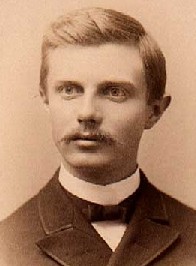Frederick Jackson Turner facts for kids
Quick facts for kids
Frederick Jackson Turner
|
|
|---|---|

Turner c. 1890
|
|
| Born | November 14, 1861 |
| Died | March 14, 1932 (aged 70) |
| Alma mater | |
| Known for | Frontier thesis, Sectional hypothesis |
| Scientific career | |
| Fields | Historian |
| Institutions | |
| Thesis | The Character and Influence of the Indian Trade in Wisconsin (1891) |
| Doctoral advisor | Herbert Baxter Adams |
| Notable students | Thomas Perkins Abernethy |
Frederick Jackson Turner (born November 14, 1861 – died March 14, 1932) was an important American historian. He lived in the early 1900s. He taught at the University of Wisconsin and later at Harvard University.
Turner is best known for his idea called the "frontier thesis". This idea suggests that the moving western frontier greatly shaped American democracy and the American character. He believed this happened from the time of the first colonies until about 1890. He also had ideas about how different regions of the country developed. Many historians still discuss his work today.
Contents
Early Life and Education
Frederick Jackson Turner was born in Portage, Wisconsin. His father, Andrew Jackson Turner, was a newspaper editor and active in politics. His mother, Mary Olivia Hanford Turner, was a school teacher.
Turner was inspired by writers like Ralph Waldo Emerson, who wrote about nature. He was also influenced by scientists such as Charles Darwin. He graduated from the University of Wisconsin in 1884.
He later earned his PhD in history from Johns Hopkins University in 1890. His main project was about the fur trade in Wisconsin.
Turner's Big Ideas
Turner didn't write many long books. Instead, his influence came from his powerful ideas published in articles. Two of his most important ideas were the "Frontier Thesis" and the "Sectional Hypothesis."
What is the Frontier Thesis?
Turner first shared his frontier thesis in an important paper in 1893. It was called "The Significance of the Frontier in American History". He presented it at a big meeting of historians in Chicago.
Turner believed that America's success came from its move westward. He thought that the unique American identity formed where settled areas met the wild wilderness. This meeting point created a new kind of person. This person was strong and independent, shaped by the challenges of the wild.
As pioneers moved west, they left behind old European ways. They found new solutions to new problems. Over many generations, the frontier created traits like informality, bravery, and a love for democracy. These traits became known as "American."
Understanding Sectionalism
Turner's ideas about sectionalism are found in his book The Significance of Sections in American History. This book won the Pulitzer Prize in History in 1933.
Turner argued that different groups of people settled in different ways. This led to unique political, economic, and social patterns in various regions. This idea helped historians understand how different parts of America developed their own identities.
Turner's Influence and Legacy
Turner's ideas had a huge impact on how history was studied. For example, some historians used his ideas to explain how churches changed on the frontier. They believed the frontier helped create new American religious groups and practices.
His ideas also influenced popular culture. Movies and novels often showed the American West with strong, independent individuals. This image of the "rugged individual" came partly from Turner's frontier thesis. Even Disneyland's Frontierland celebrated this idea.
The Frederick Jackson Turner Award is given every year. It honors a historian's first important book about American history. This shows how important Turner's work remains today.
His former home in Madison, Wisconsin is now part of a historic area. In 2009, he was honored by being inducted into the Hall of Great Westerners.
Family and Later Life
Frederick Jackson Turner married Caroline Mae Sherwood in 1889. They had three children, but only one lived to adulthood. His grandson, Jackson Turner Main, also became a historian.
Frederick Jackson Turner passed away in 1932 in Pasadena, California. He was working as a researcher at the Huntington Library at the time.
See also
 In Spanish: Frederick Jackson Turner para niños
In Spanish: Frederick Jackson Turner para niños
- Edward Alsworth Ross
- Charles Henry Ambler – historian of West Virginia and student of Turner
- Thomas Perkins Abernethy - student of Turner at Harvard; later a noted historian
Images for kids
 | James Van Der Zee |
 | Alma Thomas |
 | Ellis Wilson |
 | Margaret Taylor-Burroughs |


